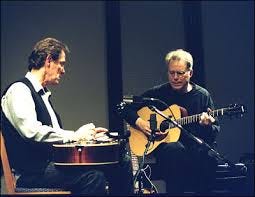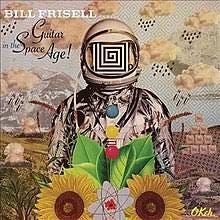Following (elusive) Breadcrumbs: Greg Leisz
Tracing the work of a master painter of the margins.
By far, the 2021 album that has captivated me most profoundly is Tone Poem, by Charles Lloyd and the Marvels. It’s out today. I’ve included a track on the below playlist but please, take the full ride.
Tone Poem continues the explorations Lloyd, the 82-year-old saxophone virtuoso, began in 2016 with the lowkey supergroup called the Marvels -- guitarist Bill Frisell, pedal steel guitarist Greg Leisz, bassist Reuben Rogers and drummer Eric Harland.
The album will no doubt be marketed under jazz; the songs stretch to rhapsodic lengths, and there is plenty of improvisation. But it’s better appreciated as a celebration of the temperamental and spiritual connections between jazz and American roots music.
Unlike the Marvels’ 2016 release I Long To See You, there are hardly any folk songs – the album opens with two tunes written by free jazz pioneer Ornette Coleman. But these, and Lloyd’s originals, are interpreted through a roots music lens. They’re set in easygoing dusty rambles that recall early country. They carry traces echoes of the blues without following blues form. And virtually every melody Lloyd plays would sound appropriate in a small-town church with worn wooden pews and lace curtains in the windows.
Lloyd flourishes in the atmospheres created by this group. He plays as though savoring its textures, and seems mindful about adding ideas that might upset the precious balance of elements. He’s the focal point, but when you listen a second or third time, the reason for his caution becomes clear: He’s tracking the elusive wisps of interplay between Frisell, a sonic wizard, and Leisz, a zen master who dwells in the deep, almost imperceptible background. Here’s a brief video clip that shows Leisz at work in the studio.
Leisz and Frisell have joined forces on a number of Frisell projects (see the spellbinding cover of “Surfer Girl” from the 2014 Guitar In the Space Age), and along the way, they’ve evolved a transcription-defiant, almost otherworldly approach to music-making. This draws on a degree of telepathy, and also an appreciation for the environmental setting of each note.
The two complement each other’s efforts without responding to every conversational volley: When Frisell gets spooky and weird, Leisz finds a chord that provides a sturdy, reassuring foundation. When Frisell steps into a melancholy theme, Leisz is there an octave higher, offering slight sobbing gestures that are a form of sonic empathy. At times on “Monk’s Mood,” the two sound like kids peering around corners during an epic round of hide and seek.
Often, though, the pedal steel is way way off in the distance. And that’s perhaps one reason Greg Leisz is not a national name despite making huge contributions to these Lloyd and Frisell records as well as familiar albums by Bruce Springsteen, Emmylou Harris, kd Lang, Sheryl Crow, Dave Alvin (he produced King of California) and literally countless others. Lang, who had Leisz on her records and in her touring band during most of her hitmaking run, was fond of telling audiences that he “single-handedly rescued pedal steel guitar from country music.”
To listen to the pedal steel or the lap steel guitar the way Leisz plays it is to follow vapor trails as they disappear. These are atmospheric instruments. While Leisz can bring the hammer down with a firm declaration when necessary, he’s more interested in creating painterly washes of sound, with no beginning and no end point. These are frequently so embedded into the texture of studio tracks they become ignorable. If you concentrate on what Leisz is doing with the Marvels on a track like “Monk’s Mood,” you’ll hear faint echoes of the melody; chords that drift into the frame with a weightless, cloudlike consistency; and phantom sustained single notes hovering over the entire mix. These serve as a kind of sonic glue, enveloping everything else that’s going on.
After diving deeply into Tone Poem, I began to seek out recordings that might illustrate some of what makes Greg Leisz an under-known figure of monumental importance – one who maybe hasn’t been appreciated because he’s forever lurking in the margins, even if his art is directly related to the way he lurks in the margins. I found enough for ten superlong playlists, including work on respectable country records and contributions on multiple instruments he made to the supergroup Works Progress Administration. Enjoy.
Yes, we have a fancy digital suggestion box. Share your favorite Underloved/Overlooked records here: echolocatormusic@gmail.com.
Please consider subscribing (it’s free!). And…..please spread the word! (This only works via word of mouth!)






